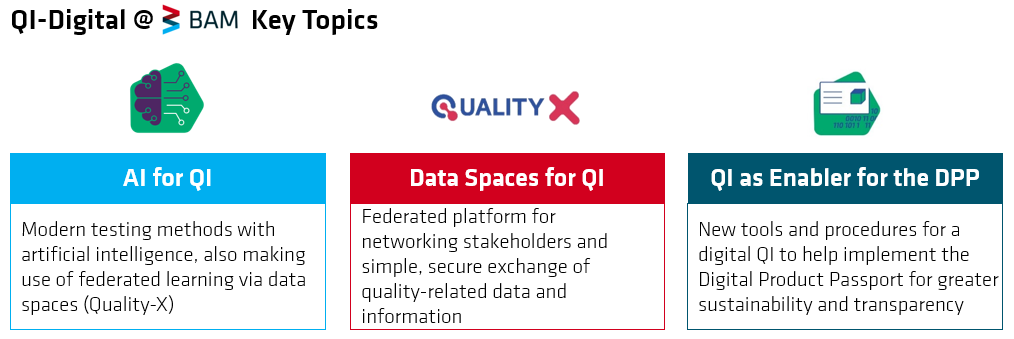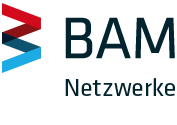Strengthening trust and enabling innovation: A digital quality infrastructure for a modern Made-in-Europe
Production and trade in increasingly complex value creation networks, the ongoing digital and green transformation and technological innovations are highly dependent on reliable assurance and efficient proof of the quality, safety and sustainability of goods, services and processes. A modern and efficient quality infrastructure (QI) is essential for this. At BAM, we develop, test and demonstrate procedures and tools for a digital QI. The focus is on practical applications in modern production and complex technical systems. For trust in Made-in-Europe in the digital age.
From document-based to data-based quality assurance!
As part of the QI-Digital initiative, BAM is working with the key players in Germany's quality infrastructure (QI) and stakeholders from business and research to develop solutions for modern quality assurance that meet the requirements of an increasingly digital and networked economy, which must also be sustainable and resilient.
The aim is to ensure and prove quality in a trustworthy and efficient manner. BAM's expertise contributes in particular to two central focal points of a digital QI:
Modern quality assurance procedures
- Objective: to develop, test and demonstrate new methods and procedures for modern testing, inspection and maintenance, incorporating the digital tools of QI (Quality-X, Smart Standards, digital certificates, etc.)
- In this way, we want to make quality assurance more transparent and efficient and at the same time increase confidence in safety and quality
Digital ecosystem for QI
- Objective: To enable companies and other private- and public-sector players in value creation networks to provide, use and exchange quality-relevant data, information and documentation confidently, sovereign, and efficiently
- This is intended to make it easier for companies to provide proof of quality and at the same time ensure sovereignty, e.g. with defined access authorizations
- To this end, we are further developing key tools for a digital QI and demonstrating their application in our pilot projects: Quality-X as a federated platform for networking institutions and simple, secure exchange of quality-related data and information based on international data spaces; Smart Standards; digital certificates, particularly for reference materials and calibration; and eAttestation.

The new digital processes and tools are fundamentally transforming quality assurance.
Source: BAM
BAM is driving the digital transformation of QI along three specific core areas that are designed to combine modern digital technologies with QI tools and integrate them into real industry applications without media discontinuity and in an interface-compatible manner:
- Data Spaces for QI: BAM is developing and implementing a sovereign data space concept for QI with its partners in QI-Digital. Quality-X is a federated platform for the networking of institutions and the simple, secure exchange of quality-related data and information. It creates an ecosystem for the quality infrastructure based on international data spaces (IDS) with harmonized interfaces.
- AI for QI: Completely new data availability through sensor technologies, thermographic imaging and other modern approaches opens up previously unknown possibilities for quality assurance. We are working on the development of corresponding digital, data-based testing methods. The focus here is on AI-based methods. We are also exploring the potential of federated learning via data spaces.
- QI as an enabler for the Digital Product Passport (DPP): The DPP as a central building block for more sustainability is dependent on the services and building blocks of digital QI for efficient implementation. BAM is a partner in the central EU project for the implementation of the DPP (CIRPASS). In addition to the technical integration into and linking with the digital tools of the QI, we are also addressing the technical and content-related design of the individual DPPs for various product groups, which must be developed in the coming years.
As part of the QI-Digital initiative, we cooperate closely with the central QI players DAkkS, DIN, DKE and PTB.

Source: BAM
Holistic QI digital ecosystem
Digital transformation is not just about technical solutions for tools and processes alone. Our activities therefore follow an integral approach for a holistic QI digital ecosystem: digital, transformative solutions require the design of far-reaching framework conditions.
- The quality infrastructure encompasses numerous stakeholders from industry and public administration. Intensive stakeholder dialog and effective transfer mechanisms are therefore central pillars of our comprehensive coordination activities at the interface between politics, business and research.
- One major hurdle can be the need to adapt the legal framework in order to actually implement innovative solutions. This is why we are not only active in standardization committees, but also carry out specialist studies to specifically examine all levels of regulation for gaps and obstacles to digital innovations in QI. Corresponding analyses and derived recommendations for action are actively shared and discussed with the relevant stakeholders, e.g. legislators and ministries.
- Other accompanying research projects round off BAM's interdisciplinary approach. For example, a study on the economic importance of quality infrastructure is providing well-founded data and findings for the first time. A trend study on QI in 2035 is also being developed in dialog with experts from various fields.
Implementation based on tangible, practical pilot projects
The complexity of developing technical innovations, coupled with the comprehensive design of framework conditions, requires implementation based on tangible, practical pilot projects. For applications in the field of modern production (Industry 4.0) and technical systems, we work on solutions for digital QI processes and tools in practical test environments. In addition to research and development on modern test methods, we integrate the digital tools of QI and test and demonstrate their interaction.
The pilot projects with their real, complex test environments are used for development, demonstration and as a lever for application - across many other applications beyond the two pilots. In the longterm, various other use cases at BAM will serve as vehicles towards a comprehensive digital transformation of QI and its cross-domain establishment. An example of such a complex test environment is the living laboratory of the Additive Manufacturing pilot project for the development and testing of digital methods for quality assurance.
Spotlights
Source: QI-Digital
Read more about Quality-X
Source: AdobeStock / Alek
Read more about
DCC - Digital Calibration Certificate
As conformity assessment bodies (CABs), testing and calibration laboratories are central pillars of the quality infrastructure. They are therefore an important stakeholder group for BAM's activities:
- With our pilot laboratory for the eAttestation, we offer important experience reports and guidance for laboratories on the implementation of the digital calibration certificate with the digital accreditation symbol.
- Within the framework of practical workshops, BAM offers laboratories a professionally supervised dialog process for exchanging information on requirements for digital QI etc.
- Our global QI-FoKuS study on the digital transformation of CABs provides the first in-depth insights into the status and trends in the industry
Background
Source: QI-Digital
Source: QI-Digital
BAM pilot projects


